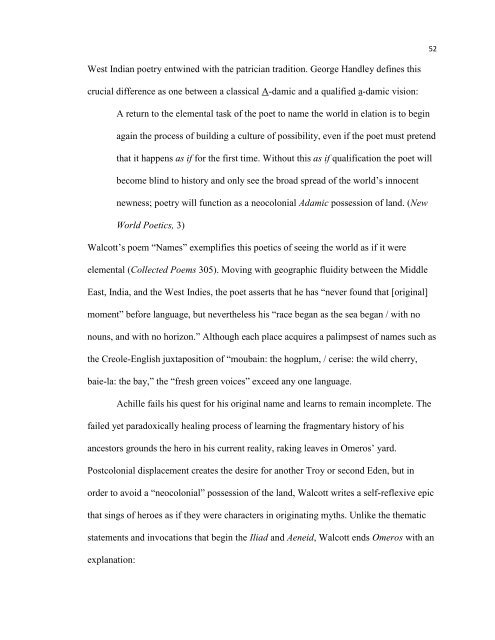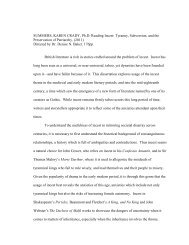RE-INHABITING THE ISLANDS - The University of North Carolina at ...
RE-INHABITING THE ISLANDS - The University of North Carolina at ...
RE-INHABITING THE ISLANDS - The University of North Carolina at ...
Create successful ePaper yourself
Turn your PDF publications into a flip-book with our unique Google optimized e-Paper software.
52<br />
West Indian poetry entwined with the p<strong>at</strong>rician tradition. George Handley defines this<br />
crucial difference as one between a classical A-damic and a qualified a-damic vision:<br />
A return to the elemental task <strong>of</strong> the poet to name the world in el<strong>at</strong>ion is to begin<br />
again the process <strong>of</strong> building a culture <strong>of</strong> possibility, even if the poet must pretend<br />
th<strong>at</strong> it happens as if for the first time. Without this as if qualific<strong>at</strong>ion the poet will<br />
become blind to history and only see the broad spread <strong>of</strong> the world‘s innocent<br />
newness; poetry will function as a neocolonial Adamic possession <strong>of</strong> land. (New<br />
World Poetics, 3)<br />
Walcott‘s poem ―Names‖ exemplifies this poetics <strong>of</strong> seeing the world as if it were<br />
elemental (Collected Poems 305). Moving with geographic fluidity between the Middle<br />
East, India, and the West Indies, the poet asserts th<strong>at</strong> he has ―never found th<strong>at</strong> [original]<br />
moment‖ before language, but nevertheless his ―race began as the sea began / with no<br />
nouns, and with no horizon.‖ Although each place acquires a palimpsest <strong>of</strong> names such as<br />
the Creole-English juxtaposition <strong>of</strong> ―moubain: the hogplum, / cerise: the wild cherry,<br />
baie-la: the bay,‖ the ―fresh green voices‖ exceed any one language.<br />
Achille fails his quest for his original name and learns to remain incomplete. <strong>The</strong><br />
failed yet paradoxically healing process <strong>of</strong> learning the fragmentary history <strong>of</strong> his<br />
ancestors grounds the hero in his current reality, raking leaves in Omeros‘ yard.<br />
Postcolonial displacement cre<strong>at</strong>es the desire for another Troy or second Eden, but in<br />
order to avoid a ―neocolonial‖ possession <strong>of</strong> the land, Walcott writes a self-reflexive epic<br />
th<strong>at</strong> sings <strong>of</strong> heroes as if they were characters in origin<strong>at</strong>ing myths. Unlike the them<strong>at</strong>ic<br />
st<strong>at</strong>ements and invoc<strong>at</strong>ions th<strong>at</strong> begin the Iliad and Aeneid, Walcott ends Omeros with an<br />
explan<strong>at</strong>ion:
















